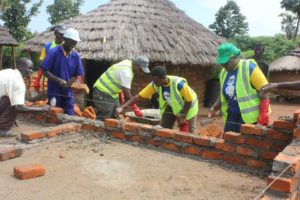Housing deficit hits the roof as Uganda’s population clocks 34.6 million people. How Housing Finance Bank Uganda plans to address this situation
By Tullah Stephen
A third of Uganda’s population will be living in the cities by the year 2040 according to the World Bank. Kampala, Uganda’s capital is anticipated to become a mega-capital hosting some 10 million people.
While this could be good for Uganda’s transformation, concerns has been raised on whether the increasing population will be able to secure affordable housing.
Uganda, a country of an estimated population of 34.6 million people, is currently ranked among the countries with the highest housing deficits in sub-Saharan Africa at eight million units. Housing deficit in Kampala alone staggers at 100,000, worse than in other parts of the country. The country’s urbanisation rate is 5.2 per cent.
However, Housing Finance Bank (HFB) in Uganda is doing something to mitigate the country’s housing deficit challenge.
The bank whose key business includes mortgages and development finance, retail banking, corporate banking, treasury and investment banking is exploring ways to provide affordable housing.
The shareholders of the bank include the Government of Uganda, which owns 49.18 per cent, the National Social Security Fund with 50 per cent shares, and the National Housing and Construction Company with 0.82 per cent shares.
The banks managing director, Mathias Katamba says one of the tailbacks for the country’s housing sector has been the low supply of affordable housing units. According to Katamba, provision of affordable housing in areas such as Kampala is hindered by the lack of affordable home financing solutions, high costs of infrastructure, and rising costs of land.
The cost of what should be a low-cost house in Uganda that is a basic stripped two bedroom apartment is 15,000 dollars, a price way above the country’s urban poor.
This has led to uncontrolled growth and expansion of housing units, which has contributed to the mushrooming of slums within and around town centres in the country.
“A majority of people in Uganda are in need of housing. They address such needs by themselves by building their homes incrementally and informally. This has led to the establishment of informal settlements in the country,” says Katamba.
HFB, which commands over 40 per cent of the mortgage market in Uganda, has spent the last few years outlining ways to overcome such challenges.
First, the bank is looking at the demand aspect, and second is the supply side.
On the demand side, the bank looks at the financing aspects. HFB offers products for both commercial and domestic property owners.
The focus, Katamba says, has mostly been on home loans which they believe create a market that increases household savings and wealth to drive long-term social economic transformation.
According to the managing director, HFB is one of the banks with the best mortgage rates in Uganda.
“Among the financial institutions offering mortgages, we have remained low even at the heights of hiking interest rates in 2015. This has continued to reaffirm our commitment to the sector,” he says.
However, Katamba adds, though some consumers often complain of high interest rates, most banks price their products based on the prevailing financial circumstances.
“We have also made use of technology to ensure that we have these products available to the population. Additionally, we are trying to help some of our customers in business with some trade finance facilities,” says the managing director.
Addressing Housing Deficit
In addressing the housing supply, the bank has partnered with like minded stakeholders in the affordable housing space such as the National Housing and Construction Company where it is financing end-buyers.
In September, the bank also partnered with real estate developers and the National Social Security Fund (NSSF). The partnership entails mobilizing local developers to produce an agreed number of units on their own land and at an agreeable price and undertaking to purchase all the units. This, Katamba says, allows the developers to dispose of all units as long as the projects attract presales and are up to the pre-determined standards.

Housing Finance Bank staff help in constructing houses for the disadvantaged in Kumi District
NSSF provides the capital through HFB, which then lends to the developers to develop the agreed units.
Katamba also reveals that HFB in partnership with Uganda Society of Architects and runs a low cost housing challenge for students in a bid to spur local innovation towards affordable housing.
In October 2016, the bank organised a housing conference its theme was “Improving Access to Housing Finance”. The conference brought together different stakeholders to discuss solutions that lead to the acquisition of decent affordable housing.
Among the attendances were policy makers, development finance partners, regulators, among other stakeholders. The theme, the MD says, was derived from the idea that mortgage markets in Uganda finance less than 2 per cent of the population.

